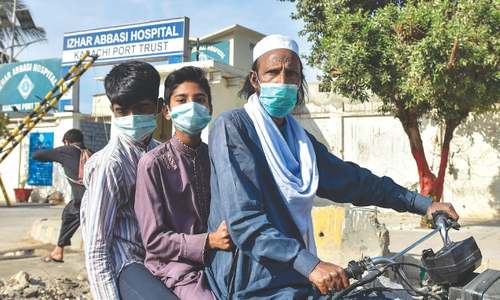A vessel carrying a soybean shipment will be shifted from Karachi Port to Port Qasim, said Karachi Port Trust (KPT) spokesperson Mohammad Shariq on Wednesday after the government was advised to consider the "exposure to soybean dust" as a cause for breathing difficulties being faced by the residents of Karachi's Keamari area.
So far, 14 people from different areas of Keamari have died and over 400 have been taken to different hospitals for treatment after reportedly inhaling toxic gas. Residents have also complained of experiencing breathing difficulties, "burning sensation in the nose", watery eyes and itching in the throat.
A letter sent to Karachi Commissioner Iftikhar Shallwani by the International Centre for Chemical and Biological Sciences (ICCBS) Director Dr Muhammad Iqbal Choudhary yesterday had said that the lab had examined blood and urine samples of people "exposed to toxic aerosols" as well as soybean dust samples collected from the port area.
He had said that while the ICCBS was still "extensively engaged in deciphering the cause of this toxic exposure", the findings so far suggested that the symptoms being experienced by Keamari residents were a result of "overexposure to soybean dust".
The KPT spokesperson said authorities had decided to move the ship during the morning but decided against it due to the low tide.
"Currently, preparations are underway to shift the ship later in the day, during high tide," he said, adding that the container should be moved by 8pm.
A police official requesting to remain anonymous said the situation in the area is now "normal". "The severity of the reactions and the number of patients have reduced ever since authorities halted unloading activities," he said.
From Tuesday morning till late night on Wednesday, approximately 90 people were affected but none of them were serious, he maintained, adding that the situation was now subsiding.
Meanwhile, Dr Ziauddin Hospital spokesperson Amir Shehzad on Wednesday said that at least 82 patients were brought to the hospital's Keamari campus over a 12-hour period, lasting from 8pm on Tuesday to 8am on Wednesday.
"None of the patients were in critical condition and were discharged after being treated," he said.
He said the patients came to the hospital from various parts of Keamari, including Jackson Market, Railway Colony, Majeed Colony, Shireen Jinnah Colony and Sikanderabad.
Hydrogen sulphide, nitric oxide found in Keamari
On Tuesday, a private laboratory monitoring air quality in the area over the past two days had found the air to be extremely polluted. However, the levels of pollutants — particularly two harmful gases which should not be present in the air at all — did not cross the limit where it could endanger life.
These areas included Bhutta village, Railway Colony, Jackson bazaar and Massan Road.
“The levels of all pollutants, particularly the hazardous hydrogen sulphide and nitric oxide gases, were found to be very high late Monday night near the Ziauddin Hospital when reports of more people being affected by the toxic gas leak emerged,” an official of the Global Environmental Laboratory (GEL) had said on the condition of anonymity.
“Harmful gases such as hydrogen sulphide and nitric oxide shouldn’t be present in healthy air at all,” he had said.
“But, the levels of these gases didn’t reach the limit where they could endanger a life, though they would have long term impact on health depending upon the extent and duration of exposure. The level of these gases was also high on Monday afternoon when we started monitoring air quality,” the official had added.
The private laboratory, certified by the Sindh Environmental Protection Agency (Sepa), was carrying out air monitoring on Sepa’s request as the environmental watchdog is ill-equipped to do the task.
Additional input from Imtiaz Ali















































